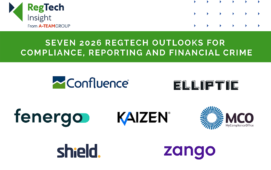
This week’s RegTech Summit in New York welcomes an array of leading-edge innovators to discuss the biggest issues, challenges, innovations, and opportunities in the RegTech industry today. One of these is the tricky question of how to digitise the customer experience with KYC and AML technology, and joining us to discuss the issue is Ali van Nes, Director of Regulatory Solutions at FactSet, who explains the importance of data quality to firms seeking a streamlined solution. Earlier this year FactSet launched a new cloud-based KYC application to help clients streamline the initial phase of their onboarding due diligence. The platform offers a single point of access to global data, leveraging intelligent search and robotic process automation to rationalise the process and visualize results.
“What we hear from clients is that they are still struggling with data quality and siloed systems,” says van Nes. “The initial phase of customer onboarding can be a cumbersome and process, and it matters that you get it right.”
But getting it right can take a long time – even at some of the big global banks, there are rumours of onboarding systems that take as long as 30 days to process a new client, while several days is still the industry norm. “These numbers are pretty shocking,” says van Nes. “No one wants to take a month to onboard a new client. Our solution can get this first phase done in minutes, which is pretty exciting.”
The vendor isn’t trying to build Rome in a day – the solution doesn’t service the entire onboarding workflow and it doesn’t offer monitoring yet, for example, around suspicious activity or anomalies. “We need to do the one thing that we do really well. And firms have been very receptive to that,” notes van Nes. “It turns out that the initial onboarding stage is a really tough pain point for the industry right now – streamlining that, digitizing it and making it repeatable, reliable and fast and auditable, actually carries a high value.”
Since 2017 FactSet has been working in this field with Glasgow-based RegTech start-up Encompass, which provides a workflow tool specialising in robotics and process automation, and works well with FactSet’s specialised expertise in areas such as entity structure and sanctions data. “Entity data combined with sanctions data gives you a really rich dataset – and when you layer on the Encompass workflow and algorithms, you get a beautiful visualisation of entity relationships, subsidiary hierarchies, ultimate beneficial ownership,” explains van Nes. “It enables the compliance officer to get a very quick relative view of the whole picture so that they can make and capture a judgement call on risk.”
This is important due to the increased scrutiny firms are experiencing from regulators around their technology systems and processes, as the whole industry pivots towards a more principles-based regulatory approach.
“Some compliance functions at firms are historically a little under-invested on the technology side, but regulators are now starting to look favourably at the use of RegTech,” concludes van Nes. “It no longer plays well if you have a manual process. It doesn’t look robust enough. Part of compliance is proving you took reasonable steps to mitigate a known risk; RegTech is becoming a factor in that discussion. Regulators want to know a firm is keeping up and taking advantage of the tools available.”
Subscribe to our newsletter




